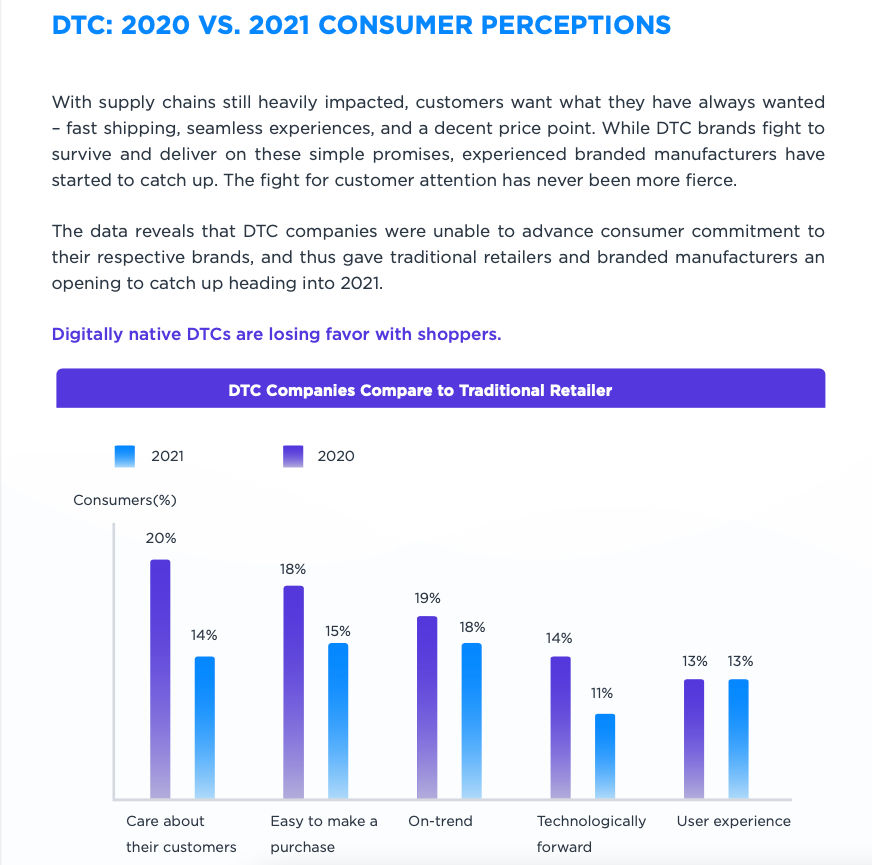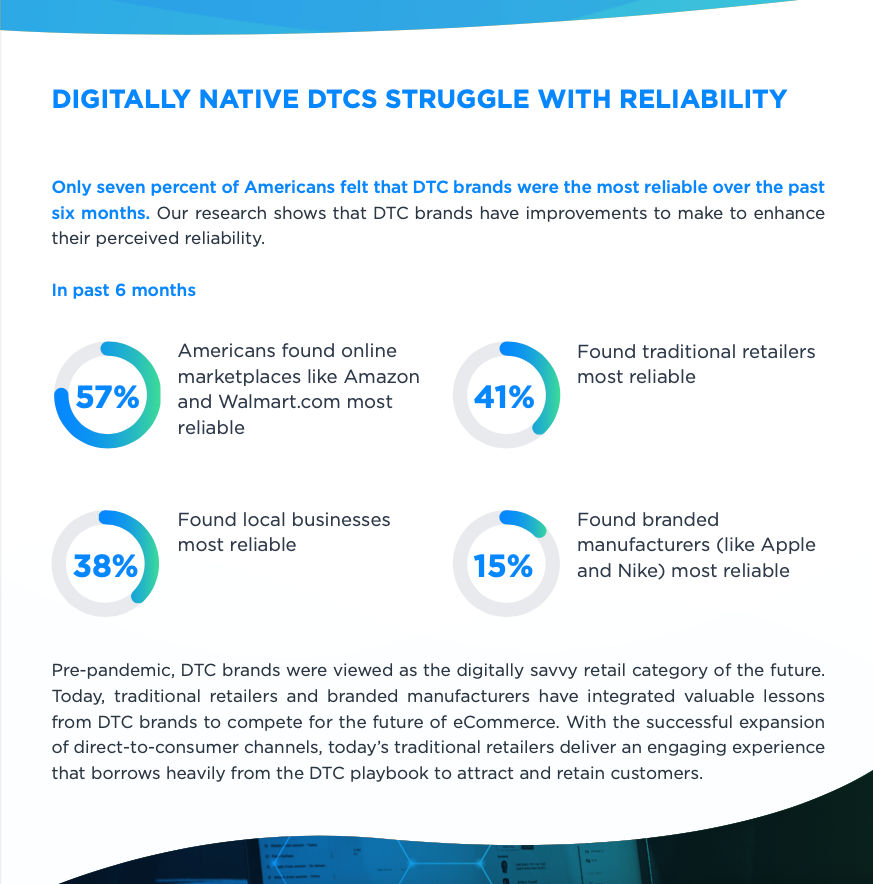
If you’re anywhere near a product-driven industry, you’ve likely heard of direct to consumer business models by now. Over the past 10 years, this way of connecting with customers has been growing steadily. If you aren’t at least exploring the idea for your product oriented business, you might be missing out on a huge opportunity. At the very least, you’re falling behind on the trends that set the expectations of the modern consumer.
To put it as simply as possible, direct to consumer (or DTC) is a method of marketing and delivering products to customers that connects brand manufacturers and the people who use their goods - without distribution companies, retailers, or other “middle men” that would be present in more traditional models.
That means using your own website (or other means) to educate prospective customers, developing your own marketing content, making your own sales, and bringing merchandise through its entire lifecycle - from manufacturing to arriving at a customer’s doorstep.
As you may have guessed, this DTC trend is largely powered by the internet. Unlike the “analog” past, where manufacturers and brands had to rely on the networks of distributors, or the foot traffic of retailers, today’s companies can take matters into their own hands. With websites, social media accounts, ecommerce tools, and other digital systems at their disposal, brands and manufacturers can regain control over every aspect of the product to customer journey.
"Marketing is key but so is authenticity. If you want to build a strong D2C brand, it is more than just spending money on media, share your brand’s compelling story to create long-term engagement and return customers. A one-time sale is a business model, but expensive to keep going, be sure to support your community in a transparent and authentic way and build your brand."
- Dana Donofree, Founder - Ana Ono
Not only are online shoppers driving DTC brands, they’re also growing to expect it! Today’s online consumers are doing more research than ever, and it’s becoming increasingly important to inform, educate, and nurture prospective customers through the buying process. They’re comparing options, reading reviews, and want to truly get to know a business before making a purchase.
In a 2018 study from Retail Dive, 81% of consumers said they intended to make a purchase from a DTC business in the coming year, a statistic that has likely increased over the last few years.
The consumer expectation of DTC options isn’t going away, so let’s take a closer look at the pros and cons for brands, some non-monetary benefits, and some recommendations for breaking into the direct-to-consumer space.
The Pros of DTC
We’ve already touched on a couple of the benefits of working directly with your customers, but the deeper you examine the kinds of relationships you can develop, the more you’ll see how truly invaluable a direct connection can be.
Controlling the brand/customer relationship also means taking on many of the tasks that were once handled by other people or companies. This too has its own major benefits.
Creating Customer Profiles
When you’re the one interacting with customers, answering questions, fulfilling orders, and navigating any complaints, you’re also building a robust collection of information. These interactions let you know who’s using your products, how they’re using them, the struggles they face, the problems they’re trying to solve, and so much more.
This crucial data can (and should) inform your messaging and marketing efforts, and help you understand your best customers on a fundamental level.
Customization
Right on the heels of relationship development, a DTC business model also creates an opportunity for brands to customize their offerings for customers. This is particularly popular in the hair and skin care industries, but can work with all kinds of businesses.
To use skin care as an example, a company may include an online survey as part of the buying process, allowing a site visitor to provide information about their struggles with skin care, products they’ve used in the past, dermatologist recommendations, product preferences, and so on. The business can then use this information to create a customized package for that customer using both the buyer’s need and their own industry expertise to create an ideal collection of products that lead directly to a satisfied customer.

Source: 2021 DTC Hype Report
Control
One of the biggest pros of the DTC is overall control. You not only have the ultimate say in how customer issues are handled, pricing, how your products are presented, etc. - you also have control of capacity. That means that you can match production to demand, ramping things up when you have the means and slowing things down when the situation calls for it.
This ability, coupled with all of the data you get from interacting with customers directly, is ideal for building sustainable systems of customer satisfaction.
Consistency
Many DTC businesses use a subscription model, with customers making a recurring, automatic purchase on a monthly or weekly basis. One of the most popular here is Dollar Shave Club, who mails out razors and other personal care products on a schedule determined by the customers themselves.
Not only does this create convenience for the customer (they don’t have to remember to go out to purchase razors), it also creates consistent revenue for the business. Coupled with the benefit of customization (customers choosing their own package of available products AND how often they receive them), it’s a win/win for everyone involved!
Competitive Advantage
All of these benefits, along with some of the reduced expenses associated with doing everything in-house/not operating a retail space, can result in a broad competitive advantage over companies who haven’t yet moved to a DTC approach. You can offer products at a lower price than major retailers, but still with enough margin to generate profits.
You have control over packaging costs, the amount of inventory you need to maintain, and investments in market research. This flexibility means you can choose where to invest and when, whether that’s product development or customer acquisition, depending on what’s best for the current state of the company.
The Cons of DTC
Going direct-to-consumer can also come with its fair share of challenges. These downsides aren’t deal breakers - as illustrated by the ongoing shift toward DTC business models - but they are worth keeping in mind.
Customer Acquisition Cost
Perhaps the largest hurdle in the DTC business model, when you’re selling directly to your customers, it’s up to you to connect with those customers. From marketing plans to digital and print ad spend, all the way to time/money spent on customer service and sales calls, the process of acquiring customers falls to you.
Gaps in Expertise
Especially for product manufacturers who are transitioning from wholesaling to direct-to-consumer, there may be large knowledge gaps when it comes to interacting with customers, tracking marketing data, and so on. While this can be mitigated through consultants, new team members, and ongoing education, it’s still important to consider what might be missing from your company’s overall knowledge base.
Managerial Complexity
Much like the potential gaps in expertise, a direct-to-consumer model incorporates every aspect of the product journey from production to fulfillment, and any ongoing customer service needs after a product has been purchased. This whole process is likely going to require different departments (or at least different responsible individuals), who all need to work together.
Without robust systems in place, this complexity can lead to breakdowns - and with it, lost business or dissatisfied customers.
Content Development
When you’re responsible for your own marketing, website, social media, and so on, the related content also has to come from in-house. Even if you outsource, the final version of the messaging is your responsibility.
Your familiarity with the industry and product make it easier to establish expertise, but it still takes time and energy.
If you look at Purple Mattress, a highly successful DTC company, they put tremendous effort into SEO, blogging, keyword rankings, consumer education, and so on. It has earned them a fantastic reputation and millions in revenue, but it also means hours and hours of content development.
In fact, most of the downsides to the DTC approach have to do with time and management. For all of the control you gain, the opposite side of the coin is responsibility.

Source: 2021 DTC Hype Report
Moving Forward
As you can see, the direct-to-consumer approach has significant advantages across many aspects of doing business. The major downsides come from gaps in experience and the sheer time, money, and effort required to sell products and services without the need for “middle men.”
So, with that in mind, we often recommend a hybrid approach that seeks to incorporate the best of both worlds.
You can lean into the DTC model without abandoning traditional sales methods. You can promote your products directly to online shoppers, and still work with distributors or brick and mortar retailers to reach more customers. Even in terms of marketing, fulfillment, or customer service, you can explore a combination of in-house and outsourced solutions to find the recipe that’s just right for your business. It doesn’t have to be all or nothing!
Spend the time to evaluate each step of both the product journey and the customer journey. This is a chance to identify what you do best and what feels out of scope. You can use this information to decide what to keep within the company and what to farm out to other, potentially more qualified providers.
Whether you’re a startup or an existing business exploring the direct-to-consumer trend, we’d love to help identify what you’re doing right, what’s missing, and what could be improved. Schedule a free 30-minute discovery call today!
SCHEDULE YOUR INTRODUCTORY APPOINTMENT!
Creating a physical product and getting it out in the world can be a struggle but it doesn't have to be. You can get answers to your questions, eliminate doubt and learn the next 2-3 steps forward. Book a free introductory appointment now.
GET THE EBOOK "TURN PRODUCTS INTO PROFITS"
If you want to make money from your products, you need the right tools at the right time. Our e-book shares tips, case studies, and best practices so you can harness your creative product ideas.
COMPANY
Products To Profits
11175 Azusa Ct.
Suite 110
Rancho Cucamonga, CA 91730
support@ProductsToProfits.com
626-396-0990
Home | Terms of Use | Privacy Policy | Return Policy | Site Map
© 2008-2021 Products To Profits, Inc. All Rights Reserved.

.png)